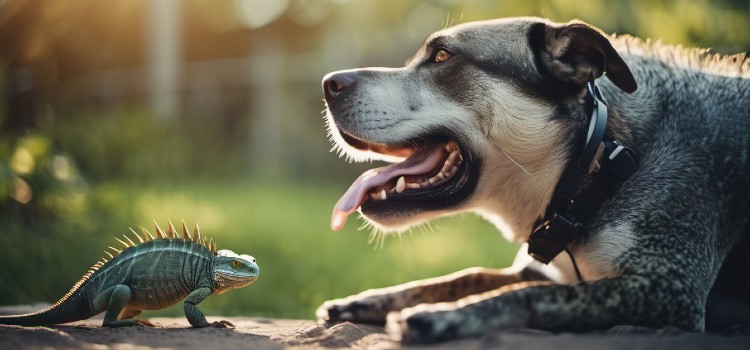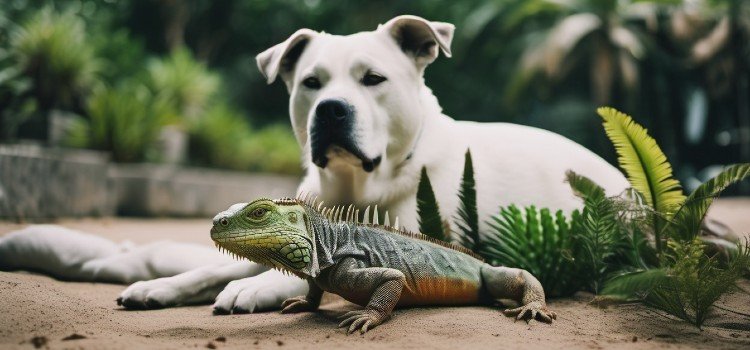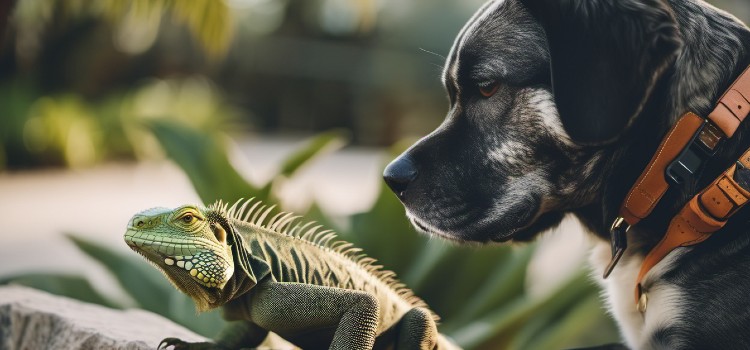As an Amazon Associate committed to the mission of improving the lives of our readers, Live-Clear.com receives a small commission from eligible purchases made through our affiliate links. This revenue enables us to keep producing insightful articles and other material.
Iguanas can be dangerous to dogs, as their bites and scratches can cause infections and even transmit diseases. It is crucial for dog owners to be cautious when their pets encounter iguanas in the wild or as pets.
Iguanas are fascinating creatures with unique behaviors and characteristics. However, many dog owners may wonder whether these reptiles pose a threat to their pets. Understanding the potential danger that iguanas can pose to dogs is important for ensuring the safety and well-being of pets.

We will explore the risks of Iguanas Dangerous to Dogs and provide valuable insights for dog owners to protect their furry companions. Additionally, we’ll discuss preventive measures and actions to take in case of an iguana-dog confrontation, helping dog owners make informed decisions when it comes to their pet’s safety around these reptiles.
Understanding Iguanas And Dogs’ Interaction
When it comes to understanding the interactions between iguanas and dogs, it’s important to consider the natural behavior of iguanas and the curiosity that dogs often exhibit towards them. Potential interactions between these two species can have implications for the safety of both pets, making it crucial for pet owners to be informed and prepared.
Iguanas Natural Behavior
Iguanas are primarily herbivores, and their natural behavior involves basking in the sun, climbing trees, and digging burrows. They are generally non-aggressive creatures, but they may display defensive behaviors when they feel threatened. This can include puffing out their dewlap, hissing, or using their tail as a whip for protection.
Dogs’ Curiosity Towards Iguanas
Dogs are naturally curious animals and may be drawn to the presence of iguanas due to their unfamiliar appearance and movement. This curiosity can lead to dogs approaching iguanas, attempting to chase or play with them, especially if the iguanas are within the dogs’ territory.
Potential Interactions Between Iguanas And Dogs
When dogs interact with iguanas, there is a possibility of various outcomes. In some cases, the iguana may feel threatened and exhibit defensive behaviors such as biting or lashing out with their tail. This can result in injuries to the dog, particularly if the iguana is cornered or feels trapped. Additionally, if a dog manages to catch an iguana, they may be at risk of ingesting harmful bacteria or parasites from the reptile.
Potential Dangers Posed By Iguanas To Dogs
Iguanas are fascinating reptiles known for their distinctive appearance and unique behaviors. While they are often kept as peculiar pets, encounters between iguanas and dogs can pose potential dangers. Understanding the risks associated with these interactions is crucial for pet owners to ensure the safety of their canine companions.
Iguanas As Carriers Of Diseases
When iguana and dogs come into close contact, there is a risk of disease transmission. Iguanas can carry various pathogens, including Salmonella bacteria, which can be harmful to dogs if ingested. This bacterium can lead to symptoms such as diarrhea, vomiting, and fever in dogs. Therefore, it’s important to prevent dogs from consuming or coming into contact with the feces or saliva of iguanas to minimize the risk of disease transmission.
Iguanas’ Defensive Behaviors
Iguanas have defensive mechanisms to protect themselves when they feel threatened. This can include tail whipping, biting, and scratching, which can cause injury to dogs during encounters. The sharp claws and teeth of iguanas can result in wounds or puncture injuries in dogs, leading to potential infection and discomfort. It is essential for pet owners to prevent direct confrontations between their dogs and iguanas to avoid injuries caused by the defensive behaviors of iguanas.
Possible Aggressive Encounters
In certain situations, iguanas may display aggressive behavior towards dogs, especially when they feel cornered or stressed. This can lead to confrontations where both animals may suffer injuries. While iguanas generally prefer to escape rather than aggress, it’s crucial for pet owners to supervise interactions between their dogs and iguanas closely to prevent potential aggressive encounters that could harm either animal. Practicing caution and providing a safe environment can help minimize the risk of these encounters.

Recognizing Signs Of Distress In Dogs
Dogs may exhibit various signs of distress when encountering iguanas. It’s crucial for dog owners to understand the signals their pets may display in such situations to ensure the well-being of their furry companions.
Dog’s Body Language Around Iguanas
When dogs are in the presence of iguanas, their body language can communicate a lot about their comfort level. Ears pinned back, tail tucked between their legs, and avoiding direct eye contact with the iguana are common indicators that a dog may be feeling uneasy. They may also show signs of pacing, yawning, or licking their lips frequently as a way to convey their discomfort.
Behavioral Changes In Dogs When Around Iguanas
Understandably, encountering iguanas can lead to behavioral changes in dogs. It’s not uncommon for dogs to exhibit more alertness, barking, or attempts to chase or approach the iguana. They may also display signs of nervousness, such as whining or restlessness.
Signs Of Potential Stress Or Anxiety In Dogs
Recognizing the signs of potential stress or anxiety in dogs is essential. Panting excessively, shaking, seeking escape, or refusing to move are clear indications that a dog is feeling distressed in the presence of iguanas. Additionally, loss of appetite, dilated pupils, or excessive drooling can also signify their discomfort.
Mitigating Risks And Ensuring Safety
Iguanas can pose risks to dogs due to their sharp claws and ability to carry salmonella. Ensuring safety involves supervision, keeping pets away from iguanas, and seeking prompt medical attention for any bite or scratch. Mitigating risks includes creating barriers and training to prevent confrontations between dogs and iguanas.
Precautionary Measures For Iguana-dog Encounters
Ensuring the safety of dogs in the vicinity of iguanas requires a set of precautionary measures. When walking dogs in areas where iguanas are present, it is important to keep them on a leash to prevent direct contact. Creating a physical barrier such as a fence or enclosure can also act as a preventive measure, preventing dogs from reaching iguanas in shared spaces.
Training Dogs To Coexist With Iguanas
Training is crucial in fostering a harmonious coexistence between dogs and iguanas. Implementing obedience training with a focus on commands such as “leave it” and “stay” can help dogs learn to refrain from approaching or interacting with iguanas. Consistent reinforcement of these commands can establish boundaries and prevent potential conflicts.
Supervision And Control In Shared Environments
In shared outdoor environments, supervision plays a pivotal role in ensuring the safety of both dogs and iguanas. Establishing designated areas for each pet and closely monitoring their interactions can mitigate risks. Regular visual checks on the surroundings and the immediate separation of pets in case of unexpected encounters can prevent confrontations and aggression.

Veterinary Perspective On Iguana-dog Interactions
From a veterinary perspective, it is crucial to understand the potential risks of iguanas interacting with dogs. While iguanas are generally non-aggressive, their sharp claws and powerful tails can pose a threat to dogs, especially if not supervised. It’s important for pet owners to ensure safe coexistence and prevent any possible conflicts between the two animals.
Health Risks For Dogs Exposed To Iguanas
When it comes to the veterinary perspective on iguana-dog interactions, it’s essential for dog owners to be aware of the potential health risks their pets may face when encountering iguanas. While iguanas are not inherently aggressive animals, their presence can pose certain risks to dogs, especially in regions where iguanas are prevalent. Dogs are naturally curious and may try to approach or even confront an iguana, putting themselves at risk of various health issues.
Common Health Concerns Of Iguanas Dangerous to Dogs
Dogs exposed to iguanas may be at risk of bites or scratches from the reptiles, leading to wounds that can become infected. Additionally, iguanas may carry parasites or bacteria that can be transferred to dogs through direct contact or ingestion. Common health concerns from iguana encounters include skin infections, gastrointestinal issues, and potential exposure to diseases such as salmonellosis. It’s crucial for dog owners to understand these risks and take proactive measures to protect their pets.
Recommendations For Dog Owners In Iguana-rich Areas
- Ensure dogs are kept on a leash when in areas with known iguana populations to prevent direct contact.
- Supervise outdoor activities and discourage dogs from approaching or engaging with iguanas.
- Regularly inspect pets for cuts or scratches that may have resulted from encounters with iguanas.
- Keep dogs’ vaccinations up to date, including those for parasites and zoonotic diseases.
- Consult with a veterinarian if a dog has had direct contact with an iguana or demonstrates unusual symptoms after exposure.
| Health Risk | Preventive Measure |
|---|---|
| Bites and scratches | Keep dogs on a leash and discourage interaction with iguanas. |
| Parasitic infections | Regularly inspect pets for signs of skin irritation or unusual behavior. |
| Bacterial transfer | Maintain proper hygiene practices and seek veterinary care if concerns arise. |
Legal Considerations For Keeping Iguanas And Dogs
Responsibilities About Iguanas Dangerous to Dogs
As a responsible pet owner, it’s important to understand the legal obligations that come with owning iguanas and dogs. Both iguana and dog owners are required to adhere to specific regulations to ensure the safety and well-being of their pets, as well as that of others.
Regulations For Shared Public Spaces
When it comes to shared public spaces, such as parks or recreational areas, iguana and dog owners must comply with local regulations and ordinances. This may include leash laws for dogs or restrictions on fascinating pet ownership for iguanas. Understanding and following these regulations is crucial to minimize any potential conflicts with other pet owners in public areas.
Liability In Iguana-dog Conflict Situations
In situations where conflicts arise between iguanas and dogs, it’s essential to consider liability. Owners of both pets can be held accountable for any damages or injuries caused by their animals. This emphasizes the need for proper supervision and training for both dogs and iguanas to prevent potential conflicts. Understanding liability in these situations is crucial for all pet owners.
Educating Dog Owners About Iguana Safety
Building Awareness About Iguanas Dangerous to Dogs
Dogs and iguanas may coexist in the same environment, but it’s essential for dog owners to understand the potential risks associated with this cohabitation. Iguanas, while not inherently aggressive, can pose a danger to dogs if they feel threatened or cornered. Understanding the behaviors and body language of iguanas can help dog owners anticipate and prevent potential conflicts between their pets and these reptiles.
Providing Resources For Safe Cohabitation
Educating dog owners about providing a safe environment for both their pets and iguanas is crucial. Resources such as informational pamphlets, online guides, and educational workshops can help dog owners acquire the knowledge and tools needed to create a harmonious living space for their pets. This includes guidance on how to secure outdoor enclosures and create separate living spaces to prevent confrontations between dogs and iguanas.
Community Initiatives For Responsible Pet Ownership
Promoting responsible pet ownership within the community is vital to ensuring the safety of both dogs and iguanas. Collaborative efforts, such as neighborhood awareness campaigns and community workshops, can address the importance of supervision and proactive measures to prevent potential conflicts. By fostering a sense of community responsibility, dog owners can work together to create a safer environment for all pets in the neighborhood.

Conclusion
Understanding the potential risks of encountering iguanas is crucial for dog owners. Taking preventive measures and supervising outdoor activities about Iguanas Dangerous to Dogs can help protect canine companions from potential harm. By keeping dogs away from areas where iguanas are commonly found and practicing caution, pet owners can ensure the safety and well-being of their furry friends.
Frequently Asked Questions On Are Iguanas Dangerous To Dogs
Yes, iguanas can hurt dogs with their sharp teeth and strong tails if provoked. It’s important to keep dogs supervised around iguanas to prevent any potential harm.
Yes, iguanas can be afraid of dogs due to their predatory nature. It’s important to keep them separate to avoid stress and potential harm. Creating a safe environment is essential for both pets.
To scare away iguanas, consider using motion-activated sprinklers or applying a commercial repellent. Blocking their access to food sources and using visual deterrents can also be effective. Keep your yard clean to discourage them from staying.
Yes, it’s okay to touch iguanas, but do so gently to avoid startling them. Approach slowly and allow them to become accustomed to your presence. Avoid sudden movements and only touch them when they seem calm and relaxed. Always respect their space and habitat.
Iguanas can pose a threat to dogs due to their sharp teeth, claws, and potential to transmit diseases.
Amazon and the Amazon logo are trademarks of Amazon.com, Inc, or its affiliates.



